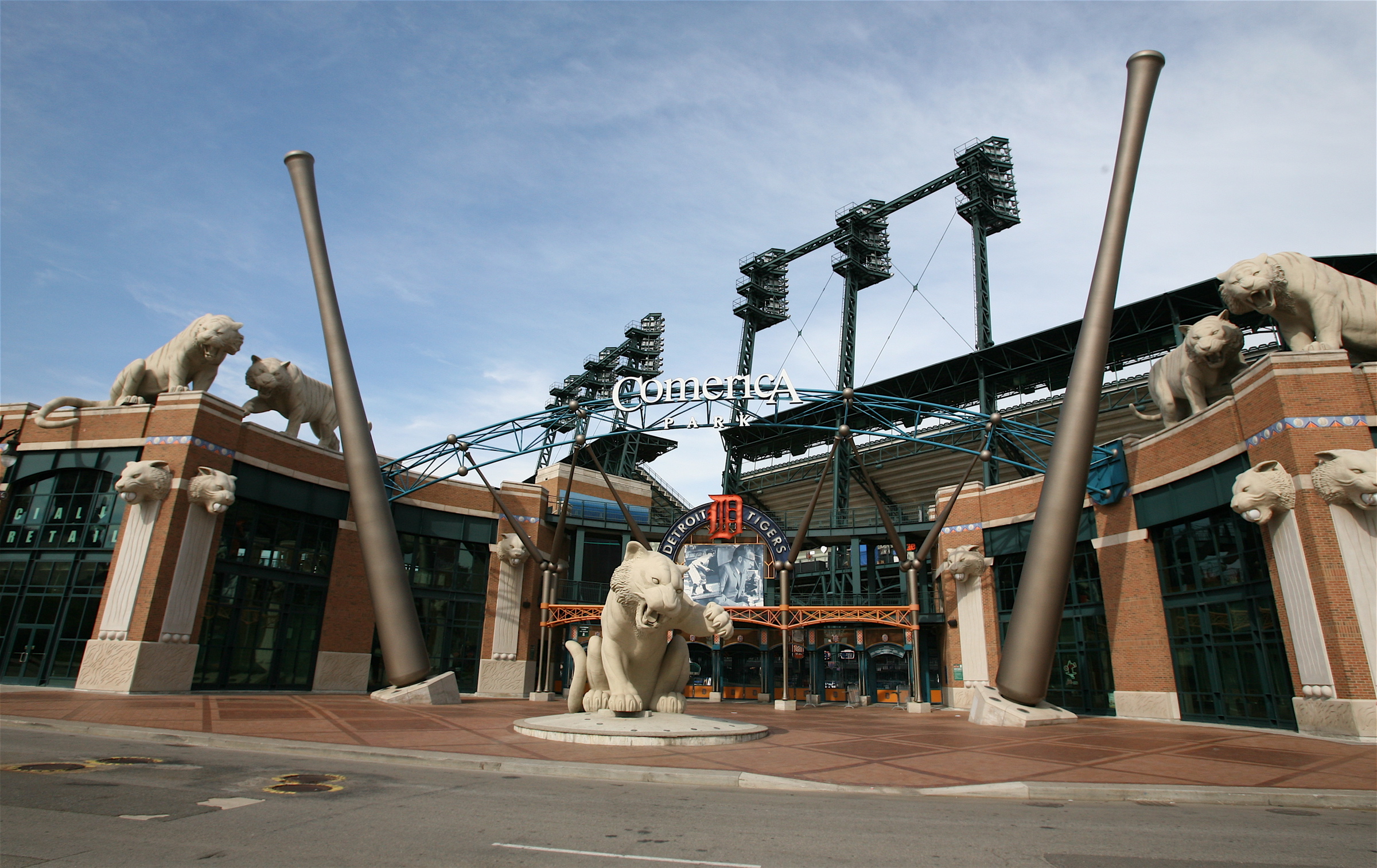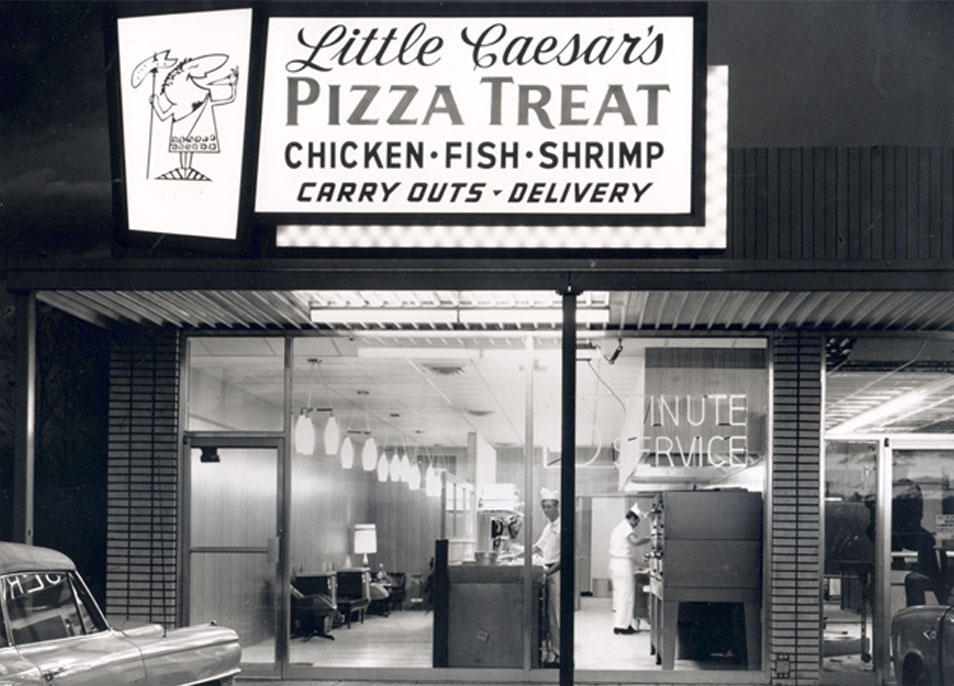 If you live in the Detroit area or anywhere in Michigan, the thought in your mind right now is “Pitchers and catchers report today.” In fact, Lakeland, Florida – the home of the Detroit Tigers’ spring training facility – is abuzz with baseball activity. It’s the surest sign that spring is around the corner.
If you live in the Detroit area or anywhere in Michigan, the thought in your mind right now is “Pitchers and catchers report today.” In fact, Lakeland, Florida – the home of the Detroit Tigers’ spring training facility – is abuzz with baseball activity. It’s the surest sign that spring is around the corner.
For the Tigers, however, spring training will begin without their owner, Mike Ilitch, who passed away Friday at the age of 87. You may not have heard of  this guy, but you’ve no doubt eaten his pizza. But his influence far transcends his successful fast food empire. Some call it rags to riches, but in this case, it’s literally a pepperoni to prosperity story.
this guy, but you’ve no doubt eaten his pizza. But his influence far transcends his successful fast food empire. Some call it rags to riches, but in this case, it’s literally a pepperoni to prosperity story.
In today’s post, consummate Tiger fan, Paul Jacobs, looks back on Ilitch’s life and the lessons he left us about community, commitment, and aspiration. For those of you trying to build a brand, a show, a radio station, or a company in the radio business, a look at Mike Ilitch’s life is a textbook lesson in how it’s done.
Here are Paul’s seven lessons from “Little Caesar,” Mike Ilitch. – FJ
In the mid-1950s, Mike Ilitch pooled his life savings and opened a pizza shop in Garden City, Michigan. Drawing on his Macedonian heritage, his wife suggested they call the business by Mike’s nickname, Little Caesar. The rest as they say is history.
In the ensuing 65+ years, Mike and his family became one of the wealthiest in the United States. Little Caesars Pizza is one of the most successful franchise businesses in history. But Ilitch didn’t stop there. He had dreams of growing his organization into a sports and entertainment powerhouse.
In 1982, he bought the floundering Detroit Red Wings, arguably the worst team in hockey at the time, for $8 million. Today, that franchise is worth an estimated $625 million, according to Forbes, and has won four Stanley Cups during his ownership tenure.
 In the early 1990s, Ilitch purchased the Detroit Tigers from fellow local pizza magnate, Domino’s Tom Monaghan for $85 million. After enduring some tough seasons, the team has reached the World Series twice, and the ballpark is regularly sold out. The Tigers estimated worth is over $1 billion.
In the early 1990s, Ilitch purchased the Detroit Tigers from fellow local pizza magnate, Domino’s Tom Monaghan for $85 million. After enduring some tough seasons, the team has reached the World Series twice, and the ballpark is regularly sold out. The Tigers estimated worth is over $1 billion.
Along with Dan Gilbert (owner of Quicken Loans), Ilitch put the city of Detroit on his back, investing heavily in real estate and infrastructure, doing what it took to help raise a beleaguered city from the ashes. A trip today to downtown Detroit reveals a city on the comeback trail. Mike Ilitch has played a huge role in its revival.
Before he grew Little Caesars into a pizza juggernaut, Ilitch was a former minor league baseball player, and was committed to winning in everything he did. The entire organization is a family business, and will be taken over by his son, Chris.
For those of us in radio, following the career path of Mike Ilitch is an object lesson in envisioning success and making it happen. Here are seven lessons, courtesy of the guy known as Little Caesar.
1. It’s about a vision.
In the late ‘80s, downtown Detroit was a barren, desolate place. Few ventured out after dark. Businesses were boarded up, and there was simply no reason to be there. All of the sterotypes you heard were true.
That’s why in 1988, when Ilitch announced he bought the formerly glorious Fox Theater downtown and was moving his corporate headquarters into that building, the reaction was laugher and shock. Nobody was investing in Detroit in those days.
During that time, I ran a local radio station and was invited to go on a media tour of the former palace. It was a total dump. Water leaked out of the ceiling and pooled up on the carpet. It was full of mold and there was debris everywhere. And outside the building, the scene on the street was just as desolate.
Ilitch had vision, faith, and passion. He believed that Detroit could come back, and felt it was his obligation and civic duty to move his company back downtown. So, despite the conventional wisdom, he made a plan and plowed forward.
The result was glorious. The revival of the Fox was the first step in what has proved to be an amazing turnaround for the city. The iconic venue has not only been host to presidential debates, concerts, and other events, but it was the first step in an amazing revitalization of Detroit. All because Ilitch wasn’t satisfied with the way things were, but envisioned what they could be.
Just as in the radio business, fulfilling a vision takes more than capital. It takes guts, belief, and committed leadership that isn’t just in it to make the stock price rise, but because they truly believe in the value and efficacy of the medium and the business.

2. It’s about family.
Mike and Marian Ilitch had seven children, and while not all work in the family business, several have played a role in the enterprise. Chris Ilitch will now run the show, taking over for his dad.
While not all great radio companies are family businesses, many started that way. And it’s notable the radio landscape is dotted with family broadcasters like the Fields, the Beasleys, the Hubbards, and others who share a long history in the business, and whose subsequent generations are now in charge of their companies. Understanding the goals, dreams, and vision of the patriarch often contributes to long-term success.
3. It’s about talent.
When Ilitch bought both the Red Wings and the Tigers, he inherited teams with players who were not ready for prime time. Some were at the end of their careers, while others weren’t experienced or talented enough to win. In both cases, he went to work, investing in developing and bringing in the best talent possible. He understood that fans love stars, and stars win championships.
For the Red Wings, this meant a steady stream of Hall of Fame players, including Steve Yzerman, Nick Lidstrom, Chris Chelios, Brendan Shanahan, and many others. He packaged the “Russian Five” – a handful of former stars from Russian hockey who were magical on ice, and had a dogged desire to win. Ilitch always understood the power of hooks and branding.
The Tigers emerged as a power for the same reasons. Ilitch hasn’t hesitated to double down on the most talented free agents available, including the best pitcher in the game, Justin Verlander, and the best hitter, Miguel Cabrera.
Ilitch understood the best way to win championships, put butts in seats, and sell merch is to grow, nurture, and showcase showcase stars, just like one of the most effective routes to success in radio.
 4. It’s about thinking big.
4. It’s about thinking big.
After rehabbing the Fox, Ilitch began to think really big. He wasn’t satisfied being a pizza king. He was driven to become a change agent in his hometown, and set out to turn around the city of Detroit. Eight years after buying the Tigers, Ilitich built Comerica Park across the street from The Fox. It was primarily a self-funded stadium with only state support for infrastructure. Unlike so much other franchise owners, Ilitch didn’t threaten to move the team in order to negotiate a better deal. Instead, he thought big, invested big, and won big.
And over the past decade, Ilitch Properties has quietly bought up 45 blocks of downtown Detroit near The Fox, and is developing what will be known as “The District Detroit” (sometimes referred to as Ilitchville by locals). The centerpiece is the new hockey arena – Little Caesar’s Arena, of course. It will also be the home of the Detroit Pistons, thanks to a megawatt deal announced late last year. This brings all four major sports in Detroit within walking distance of one another. Ilitch couldn’t have drawn it up any better.
But true to the turnaround of the city, the new arena will be surrounded by thousands of condominiums and apartments, shops and even the brand new Wayne State Business School, which Ilitch donated as part of his grand vision.
To truly succeed in the business or the media world, thinking incremental isn’t enough. In radio, we often interface with broadcasters focused on incremental change, tweaks, and baby steps. We live in a world where the best way to get meaningful results is to think big.

5, It’s about community.
After Ilitich’s passing, many stories have emerged that many of us didn’t know about. A decade before the passing of civil rights icon, Rosa Parks, she was robbed in her home and fell on hard times. Ilitch got together with real estate mogul, Al Taubman, and arranged a move into a high rise on the Detroit River. No one knew Ilitch paid Parks’ rent for ten years.
But that’s not all. In 2009, when the auto industry virtually collapsed, Ilitch lent a hand to General Motors. GM had been a sponsor of the magnificent fountains in Comerica Park’s center field for years, the best advertising location in the ballpark. As their business cratered, GM was unable to maintain that prime presence. Two other corporations approached Ilitch to take it over for up to $1.5 million over three years.
Ilitch walked away from that deal, called up Chrysler and Ford and offered them co-sponsorship of the fountain, along with General Motors, at no charge. Their sponsor logos appeared for several years accompanied by the slogan, “The Detroit Tigers Supports Our Automakers.”
And those same principles guide the best local radio stations and the companies that own them. Commitment to community is the sure-fire way to create bonds that transcend the success of sports teams…and radio stations. It’s always been about doing well by doing good.
6. It’s about not forgetting your roots.
Ilitch came from very humble beginnings. But even after he struck it big, he never forgot how he got his start in business. It began in a small store in modest Garden City, and grew into a $3 billion empire. Throughout it all, Iltich remained a regular guy.
And during this past weekend, there were stories about Ilitch walking into a random Little Caesars store, donning an apron, and making pizzas. He understood who he was, and was a truly good guy. Despite his extraordinary wealth, nobody was jealous of his success.

7. It’s about the fans.
In this blog, we often write about the UX – the User Experience. Nobody put this into practice better than Mike Ilitch. When you enter his ballpark, you know you’re in a unique space. As you walk through the corridors, there are heartfelt tributes to the history of the team going back a century. There are iconic sculptures in centerfield that serve as tributes to some of the greatest Tiger players ever. There is a ferris wheel where you sit in baseball-shaped chairs, along with a merry go-round, where the kids ride colorful tigers and enjoy their day at the ballpark.
Ilitch also had a habit of dropping into Little Caesars stores around the country, standing in line, and buying a pizza. He wanted to ensure his employees were providing great service. Ilitch would engage customers in an effort to learn more about the food and the overall experience. He was a man that put his fans and customers first, and it shows in everything he did.
For radio, a greater focus on the UX is the gateway to generating higher ratings, more sales, and greater long-term stability. From the way the phones are answered at the front desk and in the air studio, to how events are managed, leadership needs to set a high bar. Radio has more competition than ever on all fronts, and the standards need to be constantly increased.
You can read any marketing book to learn the characteristics that go into winning. But a truism is that great companies almost always have great leaders, outstanding people, and many of the attributes that Mike Ilitch espoused in the way he did business.
Thanks, Mike. I’m going to have a Pizza Pizza in your honor tonight.
- The Revolution Will Not Be Monetized - December 30, 2024
- What Kind Of Team Do You Want To Be? - October 4, 2024
- The Revolution Will Not Be Monetized - August 20, 2024




Late to the party here (sorry), but this looks like for radio, what research geeks call an “antilog” – or the opposite of an analog. Analogs should lead you to more likely result, antilogs the opposite.
Pretty much all of what you describe as Mike Ilitch is the opposite of what the radio business (taken as a whole, there are exceptions to be sure) does, so if this is an antilog, then radio’s results should be the opposite. Realistically, that isn’t the case. Radio isn’t thriving, but it isn’t the pre Mike Ilitch Detroit that the antilogs suggest it should be.
So maybe radio is getting away with a lot more than it should – if it can last, all well and good. If its a case of delayed, not denied, not so good. Food for thought anyway.
I think it’s about building an empire, Bob. And the charm of this is that both Ilitch and Dan Gilbert are getting exponentially richer by doing great things for their community. I believe that on a smaller scale, radio companies are capable of pulling off similar victories in certain local markets. Thanks for chiming in.